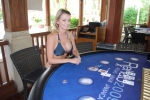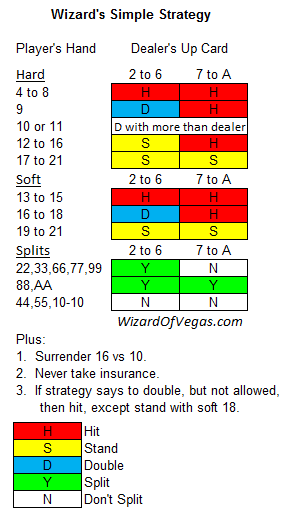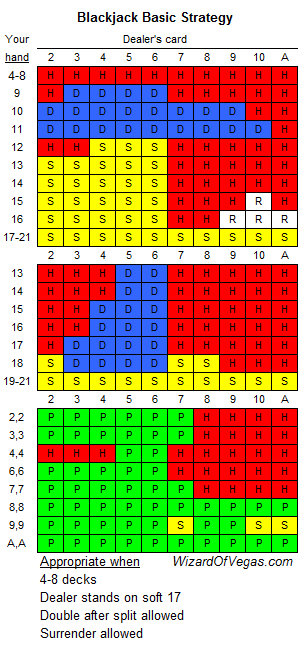Introduction
Blackjack should need no introduction. It is the most popular table game in the United States, and is easily found in casinos throughout the world. The object is simply to get more points than the dealer without going over 21.





Rules
-
Blackjack may be played with one to eight decks of 52-card decks.
-
Aces may be counted as 1 or 11 points, 2 to 9 according to pip value, and tens and face cards count as ten points.
-
The value of a hand is the sum of the point values of the individual cards. Except, a "blackjack" is the highest hand, consisting of an ace and any 10-point card, and it outranks all other 21-point hands.
-
After the players have bet, the dealer will give two cards to each player and two cards to himself. One of the dealer cards is dealt face up. The facedown card is called the "hole card."
-
If the dealer has an ace showing, he will offer a side bet called "insurance." This side wager pays 2 to 1 if the dealer's hole card is any 10-point card. Insurance wagers are optional and may not exceed half the original wager.
-
If the dealer has a ten or an ace showing (after offering insurance with an ace showing), then he will peek at his facedown card to see if he has a blackjack. If he does, then he will turn it over immediately.
-
If the dealer does have a blackjack, then all wagers (except insurance) will lose, unless the player also has a blackjack, which will result in a push. The dealer will resolve insurance wagers at this time.
-
Play begins with the player to the dealer's left. The following are the choices available to the player:
-
Stand: Player stands pat with his cards.
-
Hit: Player draws another card (and more if he wishes). If this card causes the player's total points to exceed 21 (known as "breaking" or "busting") then he loses.
-
Double: Player doubles his bet and gets one, and only one, more card.
-
Split: If the player has a pair, or any two 10-point cards, then he may double his bet and separate his cards into two individual hands. The dealer will automatically give each card a second card. Then, the player may hit, stand, or double normally. However, when splitting aces, each ace gets only one card. Sometimes doubling after splitting is not allowed. If the player gets a ten and ace after splitting, then it counts as 21 points, not a blackjack. Usually the player may keep re-splitting up to a total of four hands. Sometimes re-splitting aces is not allowed.
- Surrender: The player forfeits half his wager, keeping the other half, and does not play out his hand. This option is only available on the initial two cards, and depending on casino rules, sometimes it is not allowed at all.
-
-
After each player has had his turn, the dealer will turn over his hole card. If the dealer has 16 or less, then he will draw another card. A special situation is when the dealer has an ace and any number of cards totaling six points (known as a "soft 17"). At some tables, the dealer will also hit a soft 17.
-
If the dealer goes over 21 points, then any player who didn't already bust will win.
-
If the dealer does not bust, then the higher point total between the player and dealer will win.
-
Winning wagers pay even money, except a winning player blackjack usually pays 3 to 2. Some casinos have been short-paying blackjacks, which is a rule strongly in the casino's favor.
Hand Signals
The player cards in blackjack are usually dealt face up, but in single-deck and double-deck games, they are dealt face down. Here is how to indicate what you want to do under both kinds of games.
-
Hit: In a face-up game, tap the table with your finger. In a facedown game, scrape your cards lightly against the felt.
-
Stand: In a face-up game, wave your hand horizontally. In a facedown game, put your cards down face down, preferably tucking them under your bet.
-
Double: In a hand-held game, first put your cards down, face up. Next, whether the game is face up or face down, put your additional wager behind your original wager. If you have a pair, hold up your index finger, to designate that you want one card, as opposed to splitting.
-
Split: In a hand-held game, first put your cards down, face up. Next, whether the game is face up or face down, put your additional wager next to your original wager. If you have two fours or two fives, the dealer may not be sure if you want to double or split, so make a V sign with your fingers to indicate you want to form two hands.
-
Surrender: In a hand-held game, first put your cards down, face up. Next, whether the game is dealt face up or face down, touch the felt with your index finger and make a horizontal line, about six inches long, behind your wager. Make sure the dealer is watching carefully, because if he isn't, he may think you want to hit. It doesn't hurt to say "surrender" as well, particularly the first time you do this with a new dealer. Few players invoke the option to surrender, so dealers don't see the signal often.
Wizard's Simple Strategy
Through the years, I've learned that very few people have the will to memorize how to play every possible situation in blackjack. For the rest of you, I present the "Wizard's Simple Blackjack Strategy." To use it, look up your hand along the left, the dealer's up card along the top, and the body of the table will say what to do.

If you are not familiar with the terminology, a "hard" hand is one that has no aces, or one where aces are forced to count as one point, lest the hand bust. A "soft" hand is one with at least one ace, and you are able to count the ace as 11 points without busting.
An "N" indicates the player should not split. In these cases, the player should treat the hand as a hard total.
With a total of hard 10 or 11, the player should double if he has more points than the dealer. For this purpose, a dealer ace counts as 11 points. To be specific, the player should double with 10 points against a dealer 2 to 9, and with 11 points against a 2 to 10.
One question I get asked a lot is what to do when the dealer offers you "even money." This happens when you have a blackjack and the dealer has an ace showing. Accepting even money is the same thing as making an insurance bet. Regardless of whether the dealer has a blackjack or not, an insurance bet will guarantee being paid even money. However, insurance is still a bad bet. In a six-deck game, the dealer will not have a blackjack with an ace up 69.45% of the time. It is better to have a 69.45% chance of winning 1.5 times your money than a 100% chance to win 1.0 times your money. Multiplying 69.45% by 1.5, we see that declining even money results in an average win of 1.042 times your bet, more than the guaranteed payoff of 1.0. If you don't want to gamble, you shouldn't be playing in the first place.
Basic Strategy
The following table is known as the "basic strategy." It shows the mathematically best way to play any given situation, according to the player's total points and the dealer's up card. It should be emphasized that the basic strategy is not magic and does not guarantee winning. For any given situation, over millions of hands, the basic strategy will show the decision that wins the most, or loses the least.

Key to basic strategy:
H = Hit
S = Stand
D = Double
P = Split
R = Surrender
The same additional points that apply to the Wizard's Strategy, apply to the Basic Strategy:
-
If the strategy says surrender, but you are not allowed to because you have more than two cards, or surrender is not allowed in the first place, then hit.
-
If the strategy says double, but you are not allowed to because of more than two cards, or it isn't allowed in the first place, then hit, except stand on soft 18.
- Never take insurance or "even money."
House Edge
The house edge depends on exactly the rules followed. What I consider to be the standard Strip rules are as follows:
- Six decks
- Dealer stands on soft 17
- Surrender allowed
- Double after split allowed
- Re-splitting aces allowed
Under these rules, using Basic Strategy, the house edge is 0.29%. Using the Wizard's Simple Strategy, the house edge is only 0.14% higher, at 0.43%.
Further Reading
My companion site, WizardOfOdds.com, has tons of additional information about blackjack.



